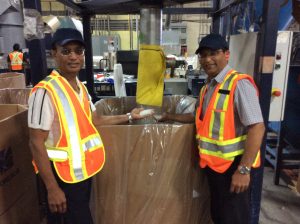
Kal Polymers is growing strong after 25 years
Canadian Plastics
Canadian PlasticsAs it hits the quarter-century mark, the Mississauga, Ont.-based compounder is heading off into new directions.
Not all parties are created equal. A New Year’s Eve celebration will always be more enjoyable, for example, than a going-away party before someone starts a 10-year prison term. By any standard, however, Kal Polymers’ 25th anniversary bash was a big hit. Held in Mississauga, Ont. on a Saturday night in late-August, more than 450 guests showed up to dance to a live band, eat, drink, network, and listen to speeches by company employees, customers, and local political dignitaries. And it wasn’t until 2:00 am on Sunday that the last party goers left for home.

Gobi Saha (left) and Kal Polymers purchasing manager Yatin Dalvi on the shop floor. Photo Credit: Canadian Plastics
For the Mississauga-based, family-owned company, the milestone event was a well-earned opportunity to celebrate a classic success story. The firm was founded in 1992 as Kal Trading by husband-and-wife team Gobi and Kelly Saha as a buyer and seller of post-industrial plastic scrap. “My background was in the packaging sector, which is where I first realized how much plastic material was being wasted by heading for landfill,” said company president Gobi Saha. “I wanted to give this material a second life by finding suitable applications. Our emphasis was on automotive at first, which generates large quantities of waste.” The company quickly expanded from the couple’s garage into a rented warehouse and — in 2002 — settled into its current location: a 135,000-square-foot plant and warehouse formerly owned by Rubbermaid Newell Co.
Along the way it also grew from 5 employees to its present workforce of 80; and most importantly, also expanded its initial mandate. “We gradually grew from being a resin distributor into a compounder with the capability to process pellets from auto parts scrap, packaging films, sheets, trims, fluff, fines and powder, purge with paint, print, barrier, lamination, and coextruded and coated parts,” Saha said. “We buy post-industrial plastic scrap through long-term scrap management programs and spot buys and turn it into compounded pellets, and handle a wide range of materials, including PP, TPO, PE, PC, PC/ABS, and ABS. Our most commonly compounded material is PP, which we produce in natural, white, grey, and black, whereas most competitors offer it only in black. We are also providing custom compounds based on specific applications, and achieved our ISO 9001 certification last year.”
NEW NAME, NEW DIRECTION
This dramatic shift in focus led to the renaming of the firm as Kal Polymers two years ago. At approximately the same time, the company installed a multimillion-dollar system of processing equipment that removes paint and cross-linking agents from painted auto parts — discarded automobile bumpers in particular — and turns it into near virgin-quality regrind suitable for almost any plastics application. “Paint removal is traditionally done through liquid separation, which is messy and involves adding something that’s touching your product, which then has to be removed,” Saha said. “Our seven-part machinery line is a dry process that relies on friction to strip off the paint. A dry process doesn’t add anything — it just subtracts the paint — and brings the mechanical properties much closer to the original state. Our system — which can process any polymer, as well as barrier materials and cross-linked foam materials — removes not only all of the paint, but also metalizing and volatiles. Customers have the potential to use as much as 100 per cent of the recovered material.” An even newer machinery line de-metalizes BOPP film and auto parts. “We compound this material and supply it to a company that makes totes for Home Depot,” Saha said. “This line is now sold out, and another compounding line will be added before the end of the year, giving us an additional capacity of 20 million lbs. This will also give us an opportunity for new product development; new projects in the pipeline are PP/PET substrates, HIPS/PET sheet, and several others.”
Kal Polymers also took a big step towards a leaner compounding process recently by installing a new Epicor ERP system for business management and manufacturing. “Our previous ERP system was a homegrown combination of different programs,” Saha said. “The Epicore program will allow us to really streamline our operations.” As it hits the quarter-century mark, Kal Polymers clearly believes its best days lie ahead. “We are still involved in trading, but our future is in compounding, which is what we’re becoming known for,” Saha said. “Our goal is to take in scrap from all over North America and resupply it to North America. Our mandate is to find a second life for all plastic waste.” If it keeps growing at this rate, Kal Polymers’ 30th anniversary party should be epic.
